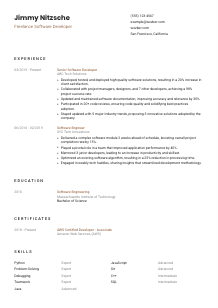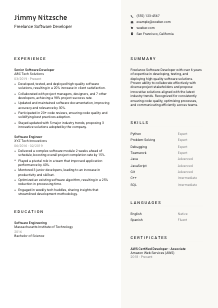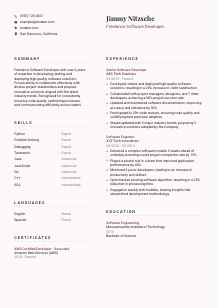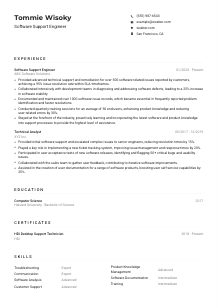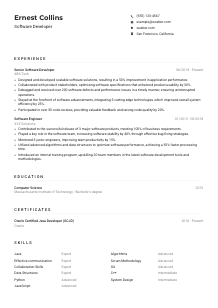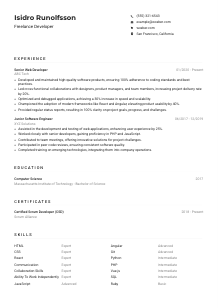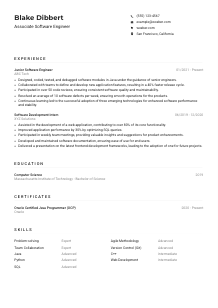Freelance Software Developer CV Example
Coding contract conventions, but your CV feels like beta testing? Dive into this Freelance Software Developer CV example, built with Wozber free CV builder. Learn how to wire your project prowess to job requirements, coding your career path to success!
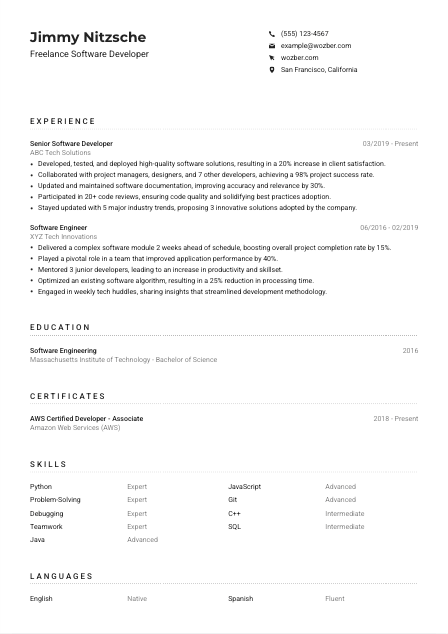
How to write a Freelance Software Developer CV?
Hey there, pathfinder in the tech realm! Navigating the competitive landscape of freelance software development demands not just skill, but also a CV that shines brighter than a well-polished GUI. Whether you're parsing through Python libraries or juggling JavaScript frameworks, your CV is the debugged script that launches your career. With Wozber's free CV builder, you're about to craft a CV that not only speaks your language but also serenades hiring managers with its ATS-compliant harmony.
Ready to boot up and compile your success story? Let's transform your professional journey into an engaging, error-free code!
Personal Details
Just like the perfect opening line of code, your Personal Details introduce the genius behind the screen. To tailor this section for a Freelance Software Developer, we'll align every detail with the precision of a well-crafted function.
1. Illuminate Your Brand
Think of your name as the class name that defines an object in the world of employment. Make sure it's legible and prominent, much like a standout function in a cluttered script.
2. Sync with the Role
Echo the role "Freelance Software Developer" beneath your name. This not only resonates with the ATS but also swiftly categorizes your expertise in the hiring manager's schema.
3. Ensure Accessible Contact Methods
Your phone and email are your callbacks – ensure they're absolutely error-free. Opt for a professional email that, like a robust piece of code, doesn't leave room for misinterpretation.
4. Declare Your Base Location
In your case, "San Francisco, California" acts as a fundamental variable. It's not simply about geography; it's about matching a critical requirement upfront, ensuring no runtime errors in the consideration of your candidacy.
5. Offer a Gateway to More Information
Including a LinkedIn profile or personal website is akin to adding a detailed comment to your code. It provides depth and invites closer inspection from those eager to understand the logic (and brilliance) behind your work.
Takeaway
Your Personal Details section sets up the initial call to action, inviting the hiring manager into your professional storyline. Ensure every expression of this first function compiles flawlessly, laying the groundwork for a memorable first impression.





Experience
Experience is your portfolio of successful project deployments. For a Freelance Software Developer, it's not just about listing jobs; it's showing how each line of your career code contributes to a robust, scalable application.
- Developed, tested, and deployed high‑quality software solutions, resulting in a 20% increase in client satisfaction.
- Collaborated with project managers, designers, and 7 other developers, achieving a 98% project success rate.
- Updated and maintained software documentation, improving accuracy and relevance by 30%.
- Participated in 20+ code reviews, ensuring code quality and solidifying best practices adoption.
- Stayed updated with 5 major industry trends, proposing 3 innovative solutions adopted by the company.
- Delivered a complex software module 2 weeks ahead of schedule, boosting overall project completion rate by 15%.
- Played a pivotal role in a team that improved application performance by 40%.
- Mentored 3 junior developers, leading to an increase in productivity and skillset.
- Optimised an existing software algorithm, resulting in a 25% reduction in processing time.
- Engaged in weekly tech huddles, sharing insights that streamlined development methodology.
1. Outline Your Command Line
Survey your projects and roles through the lens of the job description. Keywords like "develop, test, and deploy" aren't just buzzwords; they're script parameters you've lived. Aligning your experiences with these requirements shows congruence and compatibility.
2. Frame Your Syntax
List your roles and associated projects in reverse-chronological order. Each role is a function, complete with inputs (your title, company, and dates) and outputs (your accomplishments, quantified for clarity and impact).
3. Script Your Achievements
Accomplishment statements are your implementation code. They should reflect how you've optimised processes, enhanced user experiences, and debugged challenging scenarios. This isn't just what you did; it's the value you added, proven with numbers whenever possible.
4. Inject Testimonials
Quantifiable achievements are like successful test cases – they prove your code works. A '20% increase in client satisfaction' is a compelling assertion of your impact, speaking volumes in ATS and to the human eye alike.
5. Refactor and Optimise
Concision is key. Like clean code, your experience section should be devoid of redundancy. Keep it focused on relevant contributions, ensuring each word supports your candidacy as efficiently as possible.
Takeaway
The Experience section is where your professional legacy comes to life. It's about showcasing the impact you've made, translated into the universal language of achievement and innovation. Curate it thoughtfully, ensuring it's bug-free and performs optimally under the scrutiny of ATS and hiring managers.
Education
In the syntax of your career, Education forms the foundational declarations. For a Freelance Software Developer, this isn't just about listing degrees; it's about demonstrating a firm ground in the theoretical underpinnings of your technical achievements.
1. Validate Your Variables
Cross-reference your education with the key requirement: a "Bachelor's degree in Computer Science, Software Engineering, or a related field." This not only passes the initial ATS scan but also directly answers the job's primary educational prerequisite.
2. Structure Your Declarations
Keep the format clean and straightforward, listing your degree, field, institution, and graduation date. Think of this as setting up your environment variables; it should be clear and easily readable at a glance.
3. Highlight Relevant Headers
If your degree aligns perfectly with the position's requirements, such as a "Bachelor of Science in Software Engineering," make it prominent. This helps affirm your foundation's relevance to the role at hand.
4. Include Commented Extensions
Relevant coursework, honors, and extracurricular activities related to software development can serve as commented lines that add depth to your education story. However, keep these concise and relevant, especially as your career progresses and these details become less focal.
5. Update Your Education Repository
Consider your education section as a living document. Even as your career progresses, maintaining an updated account of relevant courses, seminars, or workshops showcases your commitment to continuous learning and growth in the fast-evolving tech landscape.
Takeaway
Your Education section serves as the proof of concept to your practical achievements. It's the bedrock upon which your career is built, underscoring your suitability and preparedness for the tech challenges a Freelance Software Developer faces. Craft it with care, ensuring it compiles error-free in the scan of any ATS or hiring manager's review.
Certificates
In the world of software development, certifications are like bonus levels unlocked through skill and dedication. They bolster your CV's framework, providing concrete evidence of your specialized skills and commitment to staying current in the tech field.
1. Deploy Key Achievements
Before you start, it's essential to review the job post for any preferred or required certifications. Even if none are explicitly mentioned, like in our Freelance Software Developer example, choosing relevant and up-to-date certifications can set you apart.
2. Link Certificates to Requirements
Highlight certifications that directly enhance your profile for the role. For example, an "AWS Certified Developer - Associate" showcases not only your expertise in a key area but also your initiative to stay at the forefront of technology developments.
3. Version-Control Your Credentials
If a certification has an expiration date or is a recent achievement, note it. This transparency ensures your CV reflects a current and accurate snapshot of your capabilities.
4. Commit to Continuous Integration
The IT field is ever-evolving, and so should your learning curve. Actively pursuing new certifications and including them in your CV signals a dedication to professional growth and adaptability.
Takeaway
Certifications are potent testimonials to your expertise and professional zeal. They complement your experience and academic background, offering a rounded view of your capabilities. Treat them as critical patches to your professional development, ensuring your CV runs smoothly in the dynamic tech ecosystem.
Skills
Your skills section is the metadata of your CV, offering a quick lookup of your capabilities. For a Freelance Software Developer, this part provides a concise snapshot of the programming languages, development methodologies, and soft skills you bring to the table.
1. Parse Through the Requirements
Review the job posting with the precision of a compiler, identifying both the hard and soft skills it demands. This isn't just about matching keywords; it's about acknowledging the role's deep dependencies.
2. Enumerate and Map Your Skills
Directly reflect the role's needs by listing your skills with precision. For instance, proficiency in "at least two of the following: Java, Python, C++, or JavaScript" becomes a bullet-point showcase of your technical versatility.
3. Optimise for Readability and Relevance
While it might be tempting to list every technology you've ever encountered, focus instead on those that are most relevant and in demand for the role. Keep this section as streamlined and bug-free as your best code.
Takeaway
Think of each skill as a function that contributes to your overall utility as a Freelance Software Developer. By aligning them closely with the job description, you're ensuring that your CV parses correctly through both ATS and human readers, invoking a callback to the next stage— the interview.
Languages
In a globally connected world, the languages you speak can underscore your ability to communicate in diverse environments. For a Freelance Software Developer, especially one based in a multicultural hub like San Francisco, this section highlights your versatility beyond code.
1. Syntax Check for Requirements
Initiate by validating the job's language requirements against your own linguistic capabilities. Highlighting your proficiency in "English" not only satisfies a primary job requirement but also optimises your CV for broader opportunities.
2. Enumerate Relevant Languages
Prioritize listing languages that align directly with the job. For instance, if the role expects communication with international clients or teams, illustrating additional language proficiencies like "Spanish" sets you apart as a candidate with broad communicative reach.
3. Declare Language Proficiency Levels
For each language listed, clarify your level of proficiency with clear, standardized terms: Native, Fluent, Intermediate, or Basic. This clarity helps set realistic expectations for your linguistic capabilities.
4. Comment on the Importance of Multilingualism
While not always a core requirement, being multilingual can provide a competitive edge, especially in roles that require or benefit from communication with global clients or team members.
5. Review and Refactor As Necessary
Consider your language skills as part of your personal and professional development roadmap. Regularly revisiting and updating this section can reflect your ongoing commitment to improving global communication skills.
Takeaway
Your multilingual abilities enhance your CV, much like a well-commented code enhances readability and functionality. They signal your potential to engage with diverse teams and clients, adding another layer to your professional competence. Encapsulate your linguistic skills with accuracy, and watch as they translate into broader career opportunities.
Summary
Your summary is like the comment block at the top of a script, offering a succinct overview of what follows. For a Freelance Software Developer, it encapsulates the essence of your professional narrative, hooking the reader with a preview of your coding prowess and collaborative spirit.
1. Initialize with an Opening Statement
Begin with an assertive declaration of your role, like "Freelance Software Developer," followed by mentioning your years of experience. This not only establishes your identity but also frames the reader's expectations.
2. Highlight Key Achievements and Skills
"Developed, tested, and deployed high-quality software solutions" directly echoes the job description, signaling a strong alignment with role expectations. Incorporating quantifiable metrics here can further validate your impact.
3. Address Essential Role Requirements
Tactfully weave in abilities and experiences that match the job post's demands. Mentioning your proficiency in "Java and Python" or your "excellent communication and teamwork abilities" directly correlates your skills with the job's needs.
4. Condense, Compile, and Run
Keep your summary concise but powerful. Within 3-5 lines, you want to encapsulate the essence of your professional experience and potential, crafting a compelling narrative that entices hiring managers to delve deeper into the document.
Takeaway
Crafting a standout summary is akin to writing clean, efficient code; it requires thought, precision, and a touch of creativity. Let yours set the tone for the rest of your CV, showcasing your fit for the Freelance Software Developer role right from the start. With the right mix of technical acumen and soft skills, your summary is the bridge to your next compelling project.
Booting Your Freelance Software Developer Career
With each section meticulously crafted, your Freelance Software Developer CV is now ready to compile success. Leveraging Wozber's free CV builder, ATS-friendly CV template, and ATS CV scanner ensures your CV not only meets but exceeds the demands of modern hiring practices, positioning you at the forefront of the candidate queue. Remember, in the vast codebase that is the job market, your CV is your personal API documentation; make it clear, compelling, and most importantly, reflective of the invaluable developer you are. Now, go forth and deploy your career to its next great iteration!

- Bachelor's degree in Computer Science, Software Engineering, or a related field.
- Minimum of 5 years of professional experience in software development.
- Proficiency in at least two of the following programming languages: Java, Python, C++, or JavaScript.
- Strong problem-solving and debugging skills.
- Excellent communication and teamwork abilities.
- Must have the capability to understand and speak English.
- Must be located in San Francisco, California.
- Develop, test, and deploy high-quality software solutions in accordance with client requirements.
- Collaborate with project managers, designers, and other developers to ensure the best possible outcome for projects.
- Regularly update and maintain software documentation to ensure accuracy and relevance.
- Participate in code reviews to ensure code quality and best practices.
- Stay updated with the latest industry trends and technologies to propose innovative solutions.





